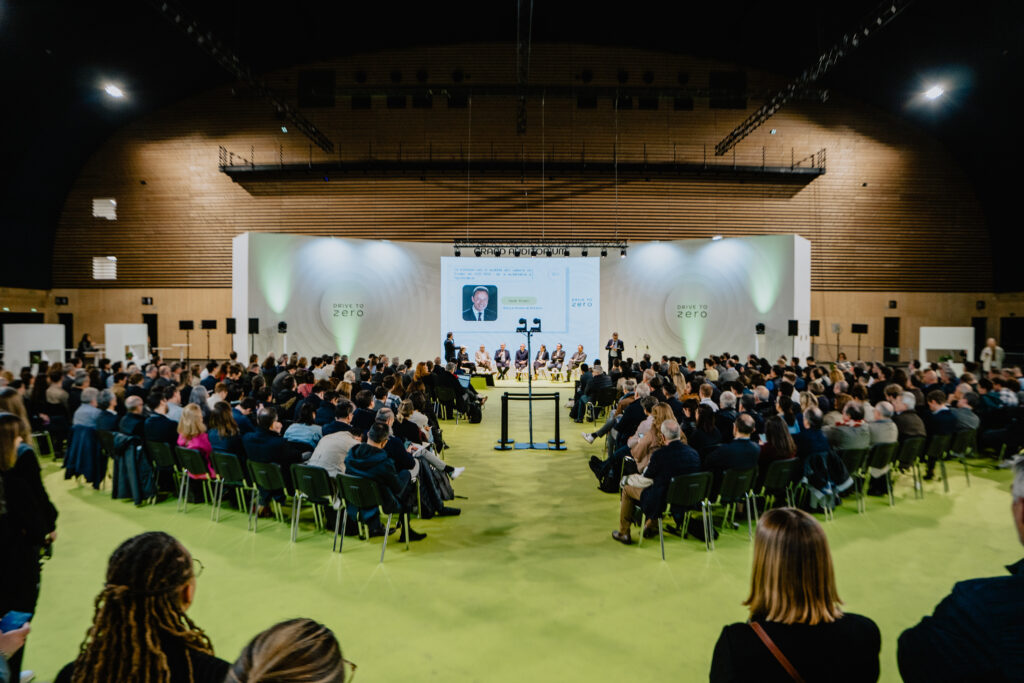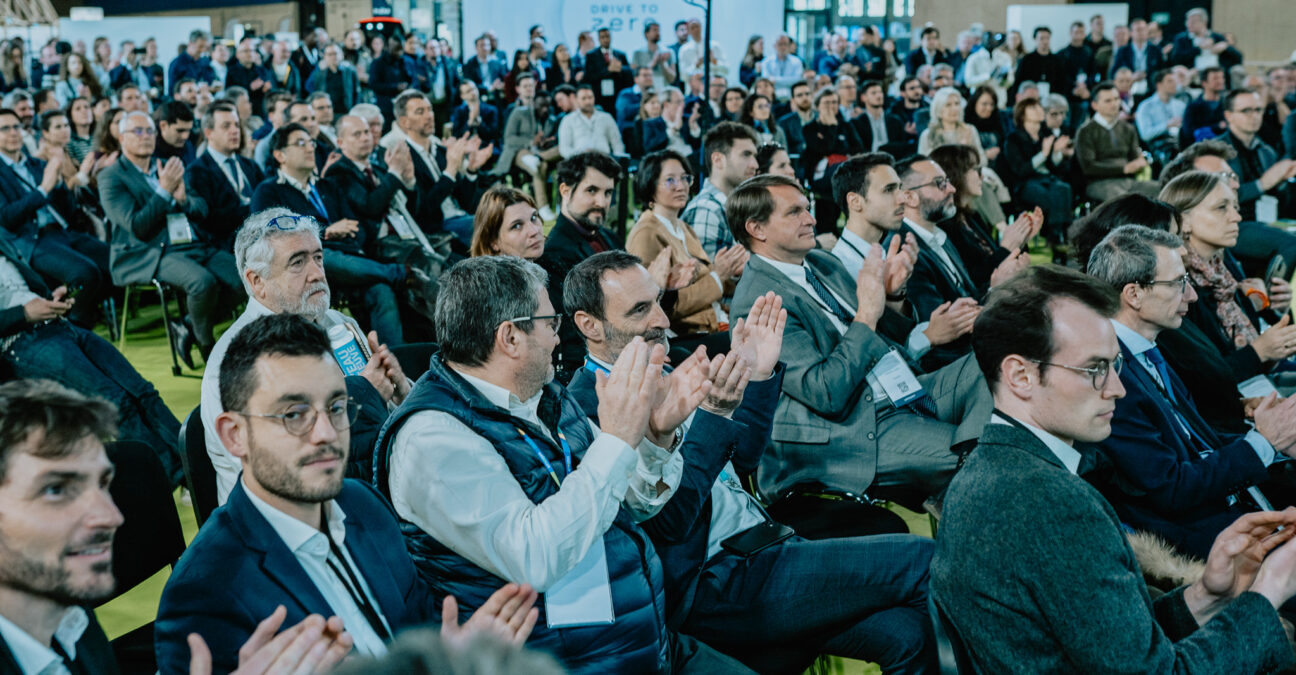On the occasion of this new meeting, all the actors concretely committed to decarbonized mobility gathered to address the ecological, economic, and social challenges related to the deployment of solutions. Various issues were discussed with perspectives and operational solutions addressing the fields of equipment, infrastructure, technological and digital advancements, as well as those related to usage, the evolution of behaviors, and new mobility practices, including financing and large-scale access to new vehicles, forms, and modes of transport and mobility.
Marked by an unprecedented program offering cross-views on the challenges of decarbonized mobility, Drive to Zero brought together a hundred exhibitors representing each segment of the value chain of mobility undergoing transformation, including EDF, ENEDIS, Mobilians, Avere (Professional Association for Electric Mobilities), Arval BNP Paribas, Webfleet, Mobivia, ALD Automotive, Engie, Mobileese, Daimler, DS, FNTV (French Federation of Passenger Transport), Flixbus… and many others. A diversity of actors were gathered to collectively understand the challenge of transport and mobility from the structural action levers capable of accelerating scale changes and successfully transitioning to decarbonized mobility models but also more diversified:
- Technologies & Equipment
- Infrastructures
- Governance and Financing
- Usage and User Behavior
For Stéphanie Gay-Torrente, Director of Drive to Zero: “For this 1st edition of Drive to Zero, we are delighted with the reception from professionals. Our approach to bring together and not oppose the solutions necessary for a deployment of decarbonized mobility adapted to uses has been validated by market players. We are therefore already working on the preparation of the 2024 edition which will take place before the Olympics and will be an opportunity to show the rapid market evolutions.”
Highlights of Drive to Zero
Round Tables & Workshops

A solid program of conferences, plenaries, round tables, and workshops designed by the strategic committee of the fair took place, bringing together public and private actors around the major issues of decarbonized mobility. For three days, many actors met, discussed, and shared their viewpoints to face the shared challenge of changes in modes of transport and mobility and implement solutions because mobility remains a major concern for residents in search of alternatives.
Inevitably, all professionals have grasped the medium-term deadlines of regulations set to disrupt industries, public authorities, and users across Europe, and all have called for a transformation “economically acceptable to maintain competitiveness and socially just as it involves democratic balances.” All actors, public and private, thus unanimously approached a transformation now considered “irreversible” where the pace of change is the key element.
The freight and goods transport sector thus demonstrated great maturity in the culture of cooperation necessary to successfully carry out its transformations, with strong involvement from communities faced with the challenges of supplying cities and territories and the real economy. While the offer of alternative delivery vehicles is slow to arrive, the prospects for evolving towards new goods transport infrastructures are strong, and the opportunities around “electric roads” with catenaries have aroused interest and enthusiasm among many professionals.
Facing the future, the historical perspective around the road, its past uses, and its representations leave professionals confident in this essential and timeless infrastructure to “support a collectivization of uses” which will nonetheless have to be accompanied and especially financed as this old infrastructure is also aging. Electrification represented a central issue of all discussions focusing on electrical capacities, transport infrastructures, and vehicles, and on which patience, caution, and realism were invoked in the long term especially in the face of the “investment wall” faced by both companies and public authorities to plan and implement the ecological, energy, and climate transition.
All professionals demonstrated their common commitment to social support in the face of evolutions that will be necessary and binding and are already mobilizing to build accessible, agile, flexible, and easy alternatives for everyone, across all territories.
Among the speakers who contributed to the panels and discussions were:
Mathieu Flonneau (Historien des mobilités), Bernard Jullien (Economiste spécialiste de l’industrie automobile), Sylvain Laval (Co-Président de la Commission Mobilités de l’Association des Maires de France), Anne-Marie Jean (Vice-Présidente de la Métropole de Strasbourg), Benoit Arrivé (Vice-Président au Développement Économique, à l’Emploi et à l’Insertion à la Communauté d’Agglomération Le Cotentin), Jean-Luc Dupont (Président du Syndicat d’énergie d’Indre-et-Loire – Maire de Chinon), Yan Wehrling (Vice-Président en charge de la transition écologique, du climat, de la biodiversité et de l’économie circulaire à la Région Ile-de-France) ; Josette Vallentgoed-Udo (Cheffe du service Zones de faibles émissions, Ville d’Amsterdam) ; Till Oberwörder (CEO Evobus, Daimler), Florence Berthelot (Déléguée générale de la Fédération nationale du transport routier), Constance Marechal Dereu (Directrice Générale de France Logistique), Fabien Derville (Président Mobivia Groupe et Decathlon) ; Sandrine Bouvier (Directrice E-Mobility de Stellantis) ; Xavier Horent (Délégué général de Mobilians); Marc Mortureux (Délégué général de la Plateforme Française de l’Automobile), Pierre Aubouin (Directeur du département Infrastructures et Mobilités à la Caisse des Dépôts), Bruno Cavagné (Président de la Fédération nationale des Travaux publics), et des représentants de think-tanks avec Thierry Pech (Directeur général de Terra Nova), Gabriel Plassat (Co-Fondateur de la Fabrique des Mobilités, Expert auprès de l’ADEME – agence de la Transition écologique), Laura Foglia (Responsable de projets Mobilités à The Shift Project), Diane Strauss (Directrice France, Association européenne Transport & Environment)…
Innovation Awards

The Innovation Awards honored companies and their zero-carbon innovations. With 198 application files, the jury, composed of mobility professionals, recognized 1 innovation in each of the 5 categories of the competition:
● The “Decarbonizing professional mobility” category rewards innovative solutions aimed at reducing greenhouse gas emissions related to professional travel. Winner: XPO Logistics with LESS: a solution that massively reduces greenhouse gas emissions by replacing diesel with HVO biofuel in fuel supplies made in the XPO network.
● The “Decarbonizing individual mobility” category aims to reward innovative solutions that reduce greenhouse gas emissions related to individual travel. Winner: Ultima Mobility: the company has developed a mold for the manufacture of a bicycle, tricycle, quadricycle, or motorcycle frame allowing the frame molding to be automated while controlling the material thickness around the hollow bodies that make up parts of the frame.
● The “Connected solutions” category rewards innovative solutions using Internet of Things (IoT), artificial intelligence (AI), and data analytics technologies to improve decarbonized mobility. Winner: Ubitransport with the 2Cloud SaaS mobility platform, a solution that helps communities and public passenger transport operators manage and optimize their school, urban, and interurban networks, regardless of their size, from a SaaS platform.
● The “Infrastructure and energy models” category rewards innovative initiatives in terms of charging infrastructure and energy models for electric vehicles. Winner: Otonohm with Ototech, a new battery architecture where each cell is directly connected to the electronics, all organized by an algorithm to directly accept or distribute any voltage, current, or signal.
● The “Decarbonized mobility for communities” category rewards innovative projects carried out by local communities to reduce greenhouse gas emissions related to travel. Winner: Rev Mobilities develops, creates, installs, and sells highly secure modular retrofit systems for all types of vehicles (passenger cars, light commercial vehicles, heavy goods vehicles).
